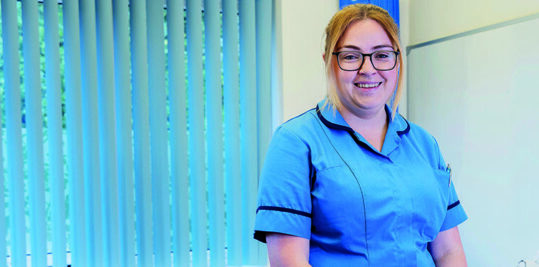My day: Working as a registered nursing associate

Sarah Hofmann, a registered nursing associate at Cathedral Medical Group Practice in Chichester, tells reporter Emily Roberts about a typical day running clinics, mentoring new staff, and her part-time role as education lead with CHAMP PCN
Ms Hofmann is a newly qualified registered nursing associate (RNA) working in general practice. She previously worked as a healthcare assistant for seven years, and prior to that as a phlebotomist, before deciding to complete a two-year course to qualify as a nursing associate, a role she started in September 2022 working for two-and-a-half days a week.
07.00
I live about 40 minutes away, so I leave at 7am to drive to the GP surgery in Chichester for an 8am start. I usually have half an hour to go through emails and tasks, attend to blood pressure results sent in by patients, check fridges and restock my room.
08.30
I have a clinic for the whole morning. The morning clinics are quite varied: I do long-term condition reviews, wound care, lots of injections and immunisations, and sometimes emergency ECGs.
My appointments are usually 10 minutes, so I’ll see 20 to 25 patients by 12.30. Mornings are very busy; we have a quick turnover of appointments with blood tests.
Related Article: My day: Working as a lead nurse in general practice
I have always worked in general practice and I love the variety. I see patients from eight weeks old to 100 years old, and deal with many different situations.
I’ve seen some patients with bad chronic leg ulcers every week for the past six or seven years, so I know them well and build a good relationship, seeing them at all stages of their life. I see women when they are pregnant and then when they bring their baby in for childhood immunisations.
My clinics can be booked up to four weeks in advance. Reception staff book the majority but for those I see regularly I will do it because I know what they need. The whole team is available to support me with the workload.
I’m the practice lead on infection control. I do compliance audits and meet management to discuss changes. It’s part of my role to come up with solutions and I normally have time blocked out of clinic for this.
My practice is quite progressive with training and I appreciate the chance to take on new skills. I had been a healthcare assistant for several years and when the opportunity came to do nursing associate training and get my registration, we decided it would help me progress.
The nursing associate is a new support role in England to bridge the gap between healthcare support workers and registered nurses to deliver hands-on, person-centred care.
12.30
I take a half-hour lunch break and I often like to get outside for a walk as Chichester is very pretty.
13.00
Afternoon clinics can vary. I could have a leg ulcer clinic or I could be with nurses in a childhood immunisation clinic. I also carry out ear syringe clinics, which we do as a locally commissioned service, and I’m just starting spirometry for asthma. I might do a general treatment room clinic if I’m mentoring a new staff member. I enjoy training and helping healthcare assistants.
Related Article: My day: Working as an ANP and practice partner
My practice is pretty good at allowing adequate treatment time. For chronic leg ulcers we have 20 to 30 minutes per leg. Spirometry is half an hour and baby immunisations are 10 minutes but with two nurses. I find I don’t struggle too much with running behind.
I do really enjoy sit down to talk with patients. Elderly patients tell me about their life while I’m bandaging their legs, or I chat to children who come in. I enjoy getting to know my patients.
I have a part-time job for our PCN as an education lead. I work two-and-a-half days in the surgery, allowing me to spend time on this role, which is flexible.
Sometimes I will be involved with a home visit, for example for a routine diabetes assessment, and we’ll get into social issues and problems the patient is facing. I’m able to offer more holistic support and refer on if need be.
17.30
I have half an hour to clean up and pack away, and grab any paperwork that’s come in throughout the day. Sometimes there is extra work or I get together with the nurses to have a debrief and discussion about the day. We are a supportive team so we share what’s happened.
The current challenges in general practice mean that people are often stressed and it’s very busy all of the time. Sometimes I do feel that I’m putting more pressure on my colleagues by asking for extra help to support my practice. But we all try to be there for each other.
Related Article: Plans for further 2,000 nursing associate training places announced
19.00
I get home at about 7pm, and my husband and I have a habit of getting changed and going out for a nice long walk. We live by the sea, so we stroll along the seafront and chat over things that have happened during our day.
Profile: Sarah Hofmann
Location: Cathedral Medical Group Practice, Chichester
Roles: Part-time registered nursing associate in general practice; part-time education lead at Chichester Alliance of Medical Practices (ChAMP) Primary Care Network.
Areas of responsibility: Running clinics at the practice, including those for long-term condition reviews, wound care, emergency ECGs, injections and immunisations. Practice lead for infection control and mentor for new staff.
Read more articles from the My Day series here

See how our symptom tool can help you make better sense of patient presentations
Click here to search a symptom

